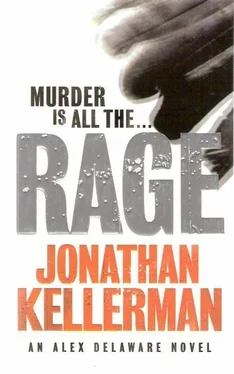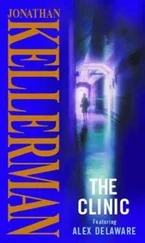Jonathan Kellerman - Rage
Здесь есть возможность читать онлайн «Jonathan Kellerman - Rage» весь текст электронной книги совершенно бесплатно (целиком полную версию без сокращений). В некоторых случаях можно слушать аудио, скачать через торрент в формате fb2 и присутствует краткое содержание. Жанр: Триллер, на английском языке. Описание произведения, (предисловие) а так же отзывы посетителей доступны на портале библиотеки ЛибКат.
- Название:Rage
- Автор:
- Жанр:
- Год:неизвестен
- ISBN:нет данных
- Рейтинг книги:3 / 5. Голосов: 1
-
Избранное:Добавить в избранное
- Отзывы:
-
Ваша оценка:
Rage: краткое содержание, описание и аннотация
Предлагаем к чтению аннотацию, описание, краткое содержание или предисловие (зависит от того, что написал сам автор книги «Rage»). Если вы не нашли необходимую информацию о книге — напишите в комментариях, мы постараемся отыскать её.
In a host of consecutive bestsellers, Jonathan Kellerman has kept readers spellbound with the intense, psychologically acute adventures of Dr. Alex Delaware-and with excursions through the raw underside of L.A. and the coldest alleys of the criminal mind. Rage offers a powerful new case in point, as Delaware and LAPD homicide detective Milo Sturgis revisit a horrifying crime from the past that has taken on shocking and deadly new dimensions.
Troy Turner and Rand Duchay were barely teenagers when they kidnapped and murdered a younger child. Troy, a remorseless sociopath, died violently behind bars. But the hulking, slow-witted Rand managed to survive his stretch. Now, at age twenty-one, he's emerged a haunted, rootless young man with a pressing need: to talk-once again-with psychologist Alex Delaware. But the young killer comes to a brutal end, that conversation never takes place.
Has karma caught up with Rand? Or has someone waited for eight patient years to dine on ice-cold revenge? Both seem strong possibilities to Sturgis, but Delaware's suspicions run deeper… and darker. Because fear in the voice of the grownup Rand Duchay-and his eerie final words to Alex: "I'm not a bad person"-betray untold secrets. Buried revelations so horrendous, and so damning, they're worth killing for.
As Delaware and Sturgis retrace their steps through a grisly murder case that devastated a community, they discover a chilling legacy of madness, suicide, and multiple killings left in its wake-and even uglier truths waiting to be unearthed. And the nearer they come to understanding an unspeakable crime, the more harrowingly close they get to unmasking a monster hiding in plain sight.
Rage finds Jonathan Kellerman in phenomenal form-orchestrating a relentlessly suspenseful, devilishly unpredictable plot to a finale as stunning and thought-provoking as it is satisfying.
Troy Turner and Rand Duchay were barely teenagers when they kidnapped and murdered a younger child. Troy, a remorseless sociopath, died violently behind bars. But the hulking, slow-witted Rand managed to survive his stretch. Now, at age twenty-one, he's emerged a haunted, rootless young man with a pressing need: to talk-once again-with psychologist Alex Delaware. But the young killer comes to a brutal end, that conversation never takes place.
Has karma caught up with Rand? Or has someone waited for eight patient years to dine on ice-cold revenge? Both seem strong possibilities to Sturgis, but Delaware's suspicions run deeper… and darker. Because fear in the voice of the grownup Rand Duchay-and his eerie final words to Alex: "I'm not a bad person"-betray untold secrets. Buried revelations so horrendous, and so damning, they're worth killing for.
As Delaware and Sturgis retrace their steps through a grisly murder case that devastated a community, they discover a chilling legacy of madness, suicide, and multiple killings left in its wake-and even uglier truths waiting to be unearthed. And the nearer they come to understanding an unspeakable crime, the more harrowingly close they get to unmasking a monster hiding in plain sight.
Rage finds Jonathan Kellerman in phenomenal form-orchestrating a relentlessly suspenseful, devilishly unpredictable plot to a finale as stunning and thought-provoking as it is satisfying.












